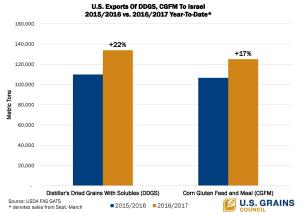Free trade agreements help provide market access for some of the largest purchasers of U.S. grains and for some smaller but steady buyers. Israel, as the first market with which the United States signed a free trade agreement, is a good example.
The United States-Israel Free Trade Agreement was implemented in 1985, when the United States exported $2.5 billion in goods to Israel, according to the U.S. Census Bureau. By 2016, overall U.S. exports soared to $13.1 billion, a five-fold increase. For U.S. agricultural exports, Israel has remained a small but important market, especially for value-added products including corn gluten feed/meal and distiller’s dried grains with solubles (DDGS).
Israel imported 786,000 metric tons of U.S. corn, DDGS and corn gluten feed, valued at $141.5 million, in 2015/2016 – a 2.5 fold increase from the previous year. U.S. DDGS exports to Israel reached nearly 134,000 tons in the current marketing year (September-March), a 22 percent increase year-over-year.
Additionally, Israel was the third largest market for U.S. corn gluten feed/meal exports in 2015/2016, responsible for 18 percent of U.S. exports. U.S. corn gluten feed/meal exports this marketing year (September-March) have increased 17 percent year-over-year to more than 125,000 tons.
“These increases are driven in part by attractive commodity price and competitive U.S. exports,” said Alvaro Cordero, U.S. Grains Council (USGC) manager of global trade.
“The Mediterranean basin is a very competitive marketplace, with U.S., Black Sea and South American grain exports competing for customers. As a result, the edge provided by the free trade agreement with United States is vital for our exporters.”
The U.S. Grains Council (USGC) works to maintain and develop relationships with trading partners like Israel, supported by funding from the U.S. Department of Agriculture’s Market Access Program (MAP) and Foreign Market Development (FMD) program. Through these trade servicing efforts, USGC is able to help U.S. grain producers and exporters take advantage of favorable conditions for U.S. exporters built into trade agreements as well as capitalize on market opportunities that might otherwise go unnoticed.
Join USGC in celebrating World Trade Week and World Trade Month by sharing stories about markets like Israel and the importance of trade on social media channels using #agexportscount and #worldtrademonth.


